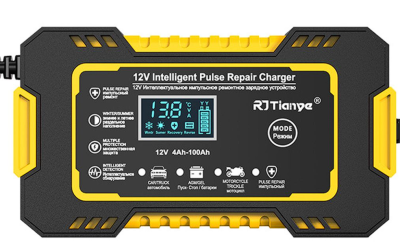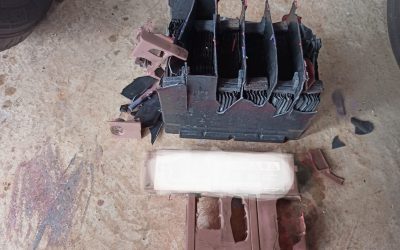Modern cars are smarter, more efficient, and more demanding on their electrical systems than ever before. One feature that has become increasingly common in recent years is the start-stop system. While this technology helps save fuel and reduce emissions, it also...
The Environmental Impact of Car Batteries: Recycling and Disposal Best Practices
Car batteries play a critical role in powering our vehicles, but they also pose significant environmental challenges if not handled properly at the end of their lifecycle. The materials inside car batteries—such as lead, acid, and plastic—are hazardous to the...
Can a Trickle Charger Break Down Sulfation in a Car Battery?
Car batteries are the silent workhorses of our vehicles. They start our engines, power electronics, and keep everything running smoothly. But when a battery begins to fail or loses charge frequently, many vehicle owners start asking questions—like whether a trickle...
Understanding Your Car Battery Test Results
If you've recently tested your car battery using a diagnostic tool like the Konwei BT22, you might find yourself looking at a list of technical readings. Let’s break these down into plain English so you know what they mean and what to do with the information. If...
The Myth of Car Batteries on Concrete: Why It’s No Longer an Issue
For many years, car owners and mechanics held a widely accepted belief that placing a car battery on concrete would cause it to lose its charge. This myth led people to insist that car batteries be placed on wood or other insulating materials when stored in garages or...
Understanding the Differences Between Calcium, EFB, and AGM Car Batteries: Which One Does Your Car Need?
Car batteries come in various types, each designed to meet specific performance needs and vehicle requirements. The three most common types are standard calcium-filled batteries, Enhanced Flooded Batteries (EFB), and Absorbent Glass Mat (AGM) batteries. Understanding...
Why Car Batteries Die More in Winter
Winter can be harsh on your car battery, often leading to unexpected failures and frustrating mornings. Understanding why car batteries are more prone to dying in cold weather is essential for preventive care and ensuring your vehicle starts reliably during the colder...
Optimizing Your Car’s Charging System: Understanding, Maintaining, and Testing the Alternator
The alternator is a vital component of your vehicle's electrical system, responsible for generating electricity to power the various electrical components and keep the battery charged. Understanding how the alternator works, how to properly care for it, and how to...
How Extreme Temperatures Affect Car Batteries: Summer vs. Winter Care
Car batteries are essential components of our vehicles, providing the necessary power to start the engine, operate electrical systems, and ensure a smooth driving experience. However, extreme temperatures, whether hot or cold, can have a significant impact on battery...
Battery Sulfation and Its Impact on Performance
Battery sulfation is a common issue that affects the performance and lifespan of lead-acid batteries, which are widely used in vehicles and other applications. It occurs when sulfate crystals build up on the battery plates, inhibiting the chemical reactions necessary...
Maximizing the Lifespan of Your Car Battery: Tips and Tricks
Car batteries are the silent workhorses of our vehicles, providing the necessary power to start engines, operate lights, and power various electrical components. However, they are often taken for granted until they fail, leaving us stranded and frustrated. Maximizing...
Mastering the Art of Jumpstarting Your Car Safely
Jumpstarting a car is one of those essential skills every driver should possess. Whether it's due to leaving the lights on overnight or an aging battery, finding yourself with a dead car battery is a frustrating situation. However, knowing how to jumpstart your...
Understanding Car Battery Corrosion and Effective Cleaning with Baking Soda
Car battery corrosion can be a common and frustrating issue for many vehicle owners. This corrosive buildup not only looks unsightly but can also hinder your battery's performance. In this article, we will explore the causes of car battery corrosion, what it looks...
Understanding The Cold Cranking Amps (CCA) in Your Car Battery
When it comes to car batteries, you may have come across the term "Cold Cranking Amps" or CCA. While it might seem like another cryptic automotive abbreviation, understanding CCA is crucial for ensuring your vehicle starts reliably, especially in colder weather. In...
Understanding Amp Hours (Ah) in Car Batteries: Powering Your Vehicle with Precision
When it comes to car batteries, a term that frequently emerges is "amp hours" or "Ah." This seemingly technical concept holds a crucial role in determining the efficiency and performance of your vehicle's electrical systems. Understanding amp hours can empower you to...
How to Check for a Parasitic Battery Drain on Your Car
A parasitic battery drain can be a frustrating problem for car owners. It occurs when an electrical component or system in the vehicle continues to draw power even when the engine is turned off, leading to a drained battery. Fortunately, there are steps you can take...
AGM Batteries
An AGM (Absorbent Glass Mat) car battery is becoming increasingly popular due to its improved performance and durability compared to traditional flooded batteries. AGM batteries use a special design that allows the electrolyte to be absorbed into a glass mat...
Exploding batteries
Car batteries can and do explode. The causes are mainly a build up of gas produced by an over heating or overcharged battery. If the gases cannot escape and a spark is introduced into the mix, the battery will explode. We mostly see this phenomenon with lead acid...
Why do car batteries fail?
Why do car batteries fail in two to five years yet some last ten years? A lead-acid cell is made of alternating plates of lead and lead-oxide with sulfuric acid in between. A 12V battery is made of 6 of these cells connected in series. Charging and discharging causes...
Testing your Alternator
If your alternator is not functioning within the the set parameters, your battery warranty might be voided - it does not matter which battery you have in your car. Always make sure that you get the alternator checked to make sure it charges your battery between 13.9v...




















